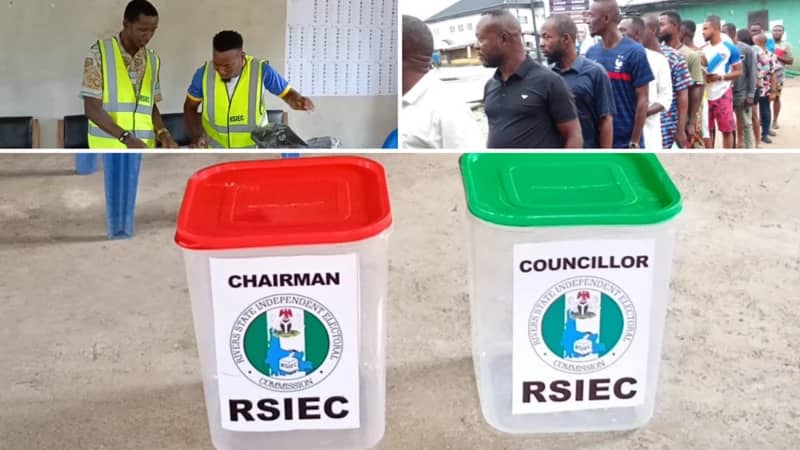With less than 12 hours to the local government and chairmanship elections scheduled to hold across the 23 local government areas of the state, Rivers State remains under emergency rule, raising concerns among residents and stakeholders about voter turnout.
The state has been under emergency rule since 18 March, spanning six months, following the suspension of Governor Siminalayi Fubara, his deputy, Prof. Ngozi Udo, and the elected lawmakers.
After the declaration, Vice Admiral Ibok-Ete Ibas was appointed as Sole Administrator of the state.
Despite the declaration, the majority of residents and stakeholders have called for the reinstatement of the suspended governor and other elected executives. Some residents, including stakeholders, argued that it was unconstitutional to declare a state of emergency that led to the suspension of elected officials, while others viewed it as a necessary step to avert political tension in the state.
Read Also:
Sim Fubara denies authorising 2027 election materials
Valerie Fubara, quiet power behind Rivers State’s first family
Wike defends peace with Fubara, slams opposition as “failed politicians”
As Rivers State gears up for the elections, with political parties accredited by the Rivers State Independent Electoral Commission (RSIEC), the atmosphere is marked by mixed feelings and uncertainty, despite assurances from security forces.
Earlier, the elections were scheduled for 9 August but were postponed to 30 August due to the political crisis.
New Daily Prime spoke with members of political parties and experts to get their views on RSIEC’s decision to proceed with the election despite the state remaining under emergency rule.
In an exclusive interview, Comrade Okey Waka, a PDP chieftain and former deputy ward 14 chairman in Obio/Akpor LGA, described RSIEC’s decision as “presidential” and one that cannot be challenged, since it aligns with the powers of the president.
“We cannot override the power of the president. When there is a problem in the state, he has the veto power to use his discretion and resolve it,” he said.
He added that the election was fixed to meet the deadline given by the Supreme Court.
According to the Supreme Court, by September or October all local government elections were supposed to have been conducted. That is why we are insisting on holding them before the deadline,” he explained.
Waka stressed that local governments cannot remain without administrators, making the election mandatory.
On whether the sole administrator had the authority to oversee the exercise, he replied:
“Would the local government remain without administration? We are running quickly to meet the deadline.”
He also noted that if all the recognised parties participated, the elections would be free and fair.
Another PDP member, Opurum Loveday, reaffirmed his loyalty to the party but criticised the insistence on holding elections under sole administratorship.
“For me, as a patriotic Nigerian who respects the rule of law and democracy, I don’t see this as a very good move. Not just because PDP is at the forefront—our party will still emerge victorious—but because of the future. Another political party might do the same tomorrow. I think it undermines democratic rules and philosophy,” he said.
On whether the sole administrator compromised the independence of the process, Loveday was blunt:
“We cannot build something right on a wrong foundation and expect it to work. The concept of sole administratorship does not provide the empowerment or neutrality needed to conduct a democratic election.”
He added that if Nigeria’s judicial system were fully functional, the process could be challenged in court.
“This election should not be conducted under emergency rule or sole administratorship. It is contradictory. If our judiciary worked, Nigerians could easily challenge this in court,” he said.
When asked what measures could guarantee credibility, Loveday dismissed the question:
“You cannot build on a wrong foundation. Let the right thing be done first. If the election still holds on Saturday, I cannot say it reflects the will of the people because I am not a party to anti-democratic practices.”
On whether PDP would accept the results, he responded:
“Of course, once people vote and RSIEC announces results confirming a winner, my party will accept it. But if the party feels disenfranchised, there is always the option of seeking redress at the tribunal.”
A constitutional lawyer, Achese-tam Fiberesikima, with 11 years’ experience, also described RSIEC’s conduct as unconstitutional.
“The tenure of the existing RSIEC, once headed by Justice Adolphus Ndebele, had not expired before the appointment of a new commission. That makes the new RSIEC illegal. They have no legal backing to conduct the election,” he said.
Fiberesikima further questioned the emergency declaration:
“There was no actual breakdown of law and order. If INEC cannot conduct by-elections under the emergency, RSIEC has no justification either.”
He cited a Supreme Court ruling that nullified a previous Rivers LG election for inadequate notice, noting the same flaw in the current exercise.
Another lawyer, Cyril Oyiboka, insisted the entire process lacks legitimacy:
“We are facing an undemocratic situation. You cannot use an unelected government to conduct elections for a democratic one,” he said.
He also faulted the rushed appointment of a new RSIEC board without allowing political parties adequate preparation.
“Even a sitting governor does not have the power to dictate elections. That is the sole responsibility of INEC. Political appointees cannot be neutral arbiters of elections,” he added.
Oyiboka concluded that while citizens could technically vote, “the process itself is already illegal. You cannot place something on nothing and expect it to stand.”
Despite government officials insisting that security forces are adequately deployed to ensure a peaceful poll, critics maintain that holding elections under sole administratorship undermines democratic principles.



